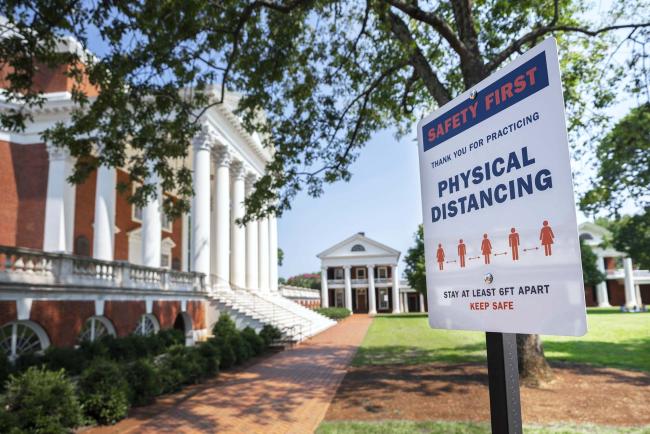COVID-19 pandemic
In March 2020, the COVID-19 pandemic upended all facets of society, and its impact was felt deeply at colleges and universities across the country.
On March 11, all UVA classes moved online, with students encouraged to return home and President Jim Ryan informing the University community that “we will not be holding classes on Grounds for the foreseeable future.”
Like the rest of the world, the School of Data Science, which was not even six months old when the shutdown began, would suddenly be forced to make dramatic adjustments.
“Phil often said during that time, ‘Building a new school is hard; building a different kind of school is harder; building a different kind of school in the middle of a pandemic is damn near impossible,'” recalled Arlyn Burgess.
Burgess added, though, that the School, despite its youth, was well positioned to weather this unprecedented disruption.
“We had a huge number of resources at our disposal, and also, data science became so important so fast in the pandemic itself,” she said, citing interest in network models and predictive analytics to track the spread of the disease.
Additionally, the School’s recent creation of an online master’s program proved even more beneficial than could have been imagined when it was conceived.
“All the residential students went into that online program,” said Phil Bourne. “So the teaching part was affected, but not as affected as badly as it could have been.”
Still, for a school that was in its infancy, particularly one whose aim was to foster collaboration, the pandemic created unavoidable challenges.
“It’s very much dependent on how people are personally interacting all day, every day,” said Bourne of the conditions needed to create the culture the School was aiming for. “And when you lose that, and everybody’s just in a Zoom window, it really affects things. When I look back on it, I’m actually surprised we did as well as we did.”
For students like Melissa Phillips, it was not the conclusion to her one-year master’s degree experience that she imagined or desired.
“It was challenging and not the way we wanted to end things because we really wanted to have that graduation moment,” she said.
Nevertheless, she credited the School for how it handled an incredibly difficult period.
“I feel like the transition was easier because of all the support we got from faculty and staff,” Phillips said.
Even though it was far from a traditional commencement, Burgess did fondly recall the poignant video remarks Bourne recorded on the steps of the Rotunda to honor the first group of master’s students to graduate since the School of Data Science had been established the year before.
Burgess remembered the moving scene and the look in Bourne’s eyes during his remarks and what she knew it signified: “The people that are getting those degrees are the future of what data science is going to be.”
